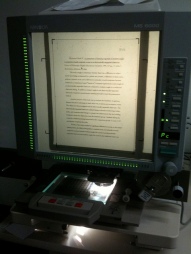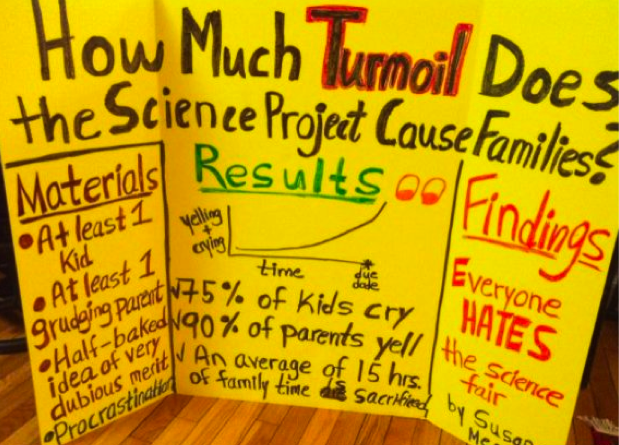I have lived through my fair share of “inquiry-based” learning, as a student and as a mom of 4 kids. Back in my school days, science fairs seemed to be presented in a way that gave students permission to delve passionately into a particular inquiry of their choosing. For me, this happened in Grade 8.

I remember creating my Science fair project on the Human Eye and how we perceive colour. Back in those days, we didn’t have the internet to provide prompts and inspiration. We didn’t have a computer in our house and research meant looking through our 1965 (or thereabouts) version of Encyclopedia Brittannica. If I found the data antiquated (which I usually did), I would peruse our local library, or in dire circumstances, I would even go to the Mississauga Central Library branch, which had far more resources; even video tapes and microfiche! It was a lot of effort for limited information, which we took for “gospel”. In the Education program, we often hear of the importance of teaching children how to properly research, choose credible sources and question intent. Resources are vast and diverse of worldviews. 30 years ago the data was harder to find, but we took it for face value.
But I digress. When I was judged on my colour project, I distinctly remember one of the judges asking me about the difference between tan and beige. I suspect his inquiry was based on the clothing trends of that decade. My display was visually appealing and colourful, but not as innovative or controversial as some other projects, such as dissolving nails and teeth in a glass of Coke. Looking back, I can’t tell you what the rubric looked like or how we were assessed. I investigated, I learned, I presented information. But was it inquiry? By definition, yes. But inquiry can be so much more.
I like how this video relates inquiry based learning to this Australian school’s mission to foster a desire in all students to make a difference; a personal, communal, national and global difference. This is something that I truly believe is the key to inquiry – why do I care and how can I make a difference?
So how can this impact how we present inquiry in the classroom? Consider for a minute differentiated learning. This is a topic that my fellow teachers Kendra, April and Emma are exploring with me for our own current inquiry-based learning. There is a wonderful variety of students that present themselves in any given classroom; different types of performers, “high” or “low” achievers, hands-on learners, EAL students, struggling readers and writers.
A Science Fair project can set up all sorts of successes, or challenges. Just look at this project designed by a frustrated mom a few years ago:

My son’s Grade 6 Science project is one example of lack of motivation. A few years ago, he, along with a partner, created a display that showed how solar panels could power a small computer. They enjoyed the hands on challenge of making it work, however they did not see the connection to real world problems that they hadn’t experienced. If they had explored a community that had scarce power, would this have deepened their inquiry into how this could provide a viable alternative for remote communities or countries? Would this have seemed more meaningful to expand the hastily written journal or reflection?
Also, this brings up the point of choice in presentation style. I am sure that if they had been given the opportunity to video blog their reflections, they would have been able to produce much deeper, meaningful reflections on their work. As someone who (for the first time ever!) did my very own video reflections this past term with my teaching partner, April, I am a firm believer that giving a choice of method will increase the content and understanding tenfold. Here are 72 ways students can show what they know!
As I approach my 3 week block, I am planning for a Unit in ELA – Short Story Writing in the Suspense genre. I think of the students in my class – the same brilliant mix of students I mentioned above, and I wonder – How will inquiry based learning help them to achieve success in this unit? How can I, as an educator and a facilitator, motivate them to share their creativity with others?
My ultimate goal is that the students will want to share their finished products. Not only does this step complete the inquiry process, but it opens the experience up to not just personal, but rather, communal learning as well. I will keep you posted!
And so, readers, I ask you: What topics excite you? Does inquiry follow naturally in these areas, and does this always translate to sharing with your community, and beyond? How do you foster inquiry in others?


Thanks for including my blog link in the post!
I’m looking forward to seeing where the learning from our project takes us…
LikeLike
Amie this is really well written and your questions directly link to inquiry in the classroom which is amazing! The thought process that you have with lessons and making sure your students get the most out of your teaching is a true gift! Keep up the good work and look forward to hearing about your experiences in three week block
LikeLike
Aw, thanks Cat! I feel like many of the lessons we are learning this semester are all blending together! I am truly fortunate to be on this middle years journey with you and the other members of our cohort – a very special group of educators, indeed!
LikeLike
Amie your question into inquiry motivates me as a teacher. I too have struggled with the difference between project based learning and true inquiry for my students. As you know I love everything about science and my brain naturally does to observing and wondering. I feel that all students have something that makes them wonder why, but the question that you posed and I feel the same way about is how to I foster this wonder into my classroom, when i have to achieve a particular outcome.
I love how you related inquiry into your own life. I truly believe that you make an awesome teacher and I can not wait to watch your reflections about your upcoming 3 week block.
LikeLike